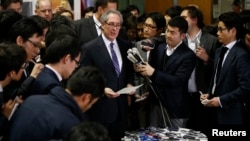TOKYO —
Big gaps remain between the United States and Japan after two days of top-level talks on a bilateral trade deal that is vital for a broader regional pact, negotiators on both sides said on Thursday.
Japan and the United States are seeking a two-way trade deal, regarded as a key part of the U.S.-led Trans-Pacific Partnership (TPP), before President Barack Obama travels to Japan for an April 24-25 state visit.
The TPP, a 12-nation grouping that would stretch from Asia to Latin America, is a centerpiece of Obama's push to expand the U.S. presence in Asia. Japanese Prime Minister Shinzo Abe has touted it as a main element of his economic growth strategy.
"Our teams arrived expecting that the talks will be tough. And our expectations have been met," U.S. Trade Representative Michael Froman told reporters after talks with Japanese Economics Minister Akira Amari.
"We made some progress over the last two days, but there are still considerable differences on our positions in key issues," he continued.
Amari said progress had been made in some areas but significant differences persisted and it was not possible to say whether a basic deal could be reached by the summit.
"The U.S.-Japan summit is one important juncture, but it's not a pre-set goal. We will continue the talks. It's the content of negotiations that's important," he told reporters.
Without substantive progress toward a deal in time for Obama's trip, the summit with Abe could end up more symbolism than substance, experts said.
The United States wants Japan to open its rice, beef and pork, dairy and sugar sectors - politically powerful sectors that Japan's Prime Minister Shinzo Abe has vowed to defend.
"We understand the challenges. These negotiations relate to fundamental reforms and the market opening of sectors in Japan that have traditionally been closed," Froman said. "These [TPP] opportunities are aligned with Japan's own economic reform agenda."
A Japanese government official told Reuters this week that lowering farm tariffs was possible but scrapping them entirely - the goal of the TPP framework - was not.
Japan also wants a timetable on U.S. promises to drop tariffs of 2.5 percent on imports of passenger cars and 25 percent on light trucks.
It was reported earlier in Japanese media that Japan was considering slashing tariffs on U.S. beef imports to less than 10 percent from the current 38.5 percent.
That proposed cut would be much deeper than one negotiated with Australia, which on Monday agreed to a trade deal with Tokyo including a halving of the levy on frozen beef to 19.5 percent.
A spokesman for Australia's foreign affairs and trade department said if Japan gave another country a better deal, a review would automatically be triggered with the aim of giving Australia equal market access.
Japan and the United States are seeking a two-way trade deal, regarded as a key part of the U.S.-led Trans-Pacific Partnership (TPP), before President Barack Obama travels to Japan for an April 24-25 state visit.
The TPP, a 12-nation grouping that would stretch from Asia to Latin America, is a centerpiece of Obama's push to expand the U.S. presence in Asia. Japanese Prime Minister Shinzo Abe has touted it as a main element of his economic growth strategy.
"Our teams arrived expecting that the talks will be tough. And our expectations have been met," U.S. Trade Representative Michael Froman told reporters after talks with Japanese Economics Minister Akira Amari.
"We made some progress over the last two days, but there are still considerable differences on our positions in key issues," he continued.
Amari said progress had been made in some areas but significant differences persisted and it was not possible to say whether a basic deal could be reached by the summit.
"The U.S.-Japan summit is one important juncture, but it's not a pre-set goal. We will continue the talks. It's the content of negotiations that's important," he told reporters.
Without substantive progress toward a deal in time for Obama's trip, the summit with Abe could end up more symbolism than substance, experts said.
The United States wants Japan to open its rice, beef and pork, dairy and sugar sectors - politically powerful sectors that Japan's Prime Minister Shinzo Abe has vowed to defend.
"We understand the challenges. These negotiations relate to fundamental reforms and the market opening of sectors in Japan that have traditionally been closed," Froman said. "These [TPP] opportunities are aligned with Japan's own economic reform agenda."
A Japanese government official told Reuters this week that lowering farm tariffs was possible but scrapping them entirely - the goal of the TPP framework - was not.
Japan also wants a timetable on U.S. promises to drop tariffs of 2.5 percent on imports of passenger cars and 25 percent on light trucks.
It was reported earlier in Japanese media that Japan was considering slashing tariffs on U.S. beef imports to less than 10 percent from the current 38.5 percent.
That proposed cut would be much deeper than one negotiated with Australia, which on Monday agreed to a trade deal with Tokyo including a halving of the levy on frozen beef to 19.5 percent.
A spokesman for Australia's foreign affairs and trade department said if Japan gave another country a better deal, a review would automatically be triggered with the aim of giving Australia equal market access.










